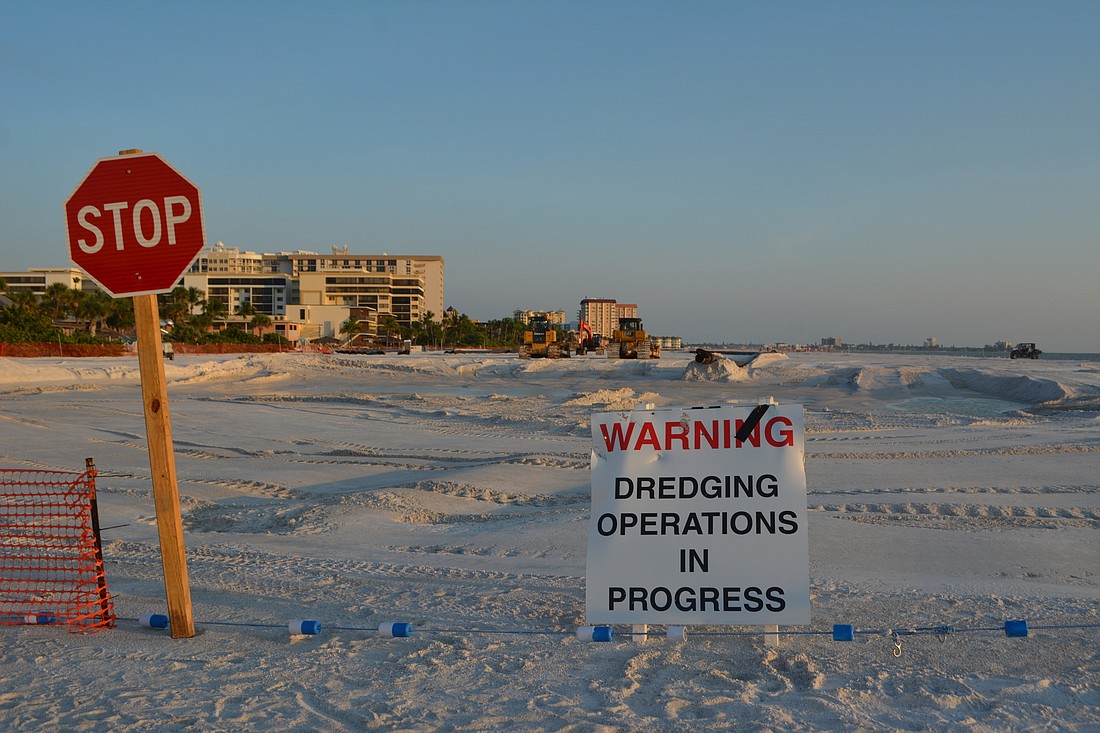- April 27, 2024
-
-
Loading

Loading

With work already under way on a Lido Key shoreline renourishment effort, a federal court judge has rejected another lawsuit attempting to challenge the joint project between the U.S. Army Corps of Engineers and the city of Sarasota.
The federal court case joins a series of failed procedural and legal efforts from Siesta Key residents hoping to block the first-ever dredging of Big Pass. The group Save our Siesta Sand 2, formed specifically in opposition to the Big Pass dredge, filed a lawsuit against the Army Corps in 2019 in the U.S. District Court for the Middle District of Florida.
On Sept. 30, Judge Steven Merryday issued a 20-page ruling rejecting SOSS2’s argument that the project failed to comply with the National Environmental Policy Act, the Clean Water Act, the Endangered Species Act and the Marine Mammal Protection Act. In the suit, SOSS2 alleged that the Army Corps had not done an adequate assessment of the potential environmental impacts of the project — a claim Merryday said is unfounded.
“A review of the administrative record confirms that the Corps arrived at rational conclusions compelled by a thorough review of the project’s effect on the affected environment,” Merryday wrote.
SOSS2 took issue with the Army Corps’s failure to prepare a full environmental impact study and reliance on information dating back to 2002 in determining the project would not negatively affect the coastal environment off Sarasota’s barrier islands. Merryday determined that Army Corps was not required to produce that study and was entitled to substantial deference in its environmental assessment of a project. Merryday also said the group conducted a robust review before moving forward.
“More than 25,000 pages of the administrative record, including the roughly 900-page environmental assessment and finding, substantiate the Corps’s extensive examination of the project’s effect,” Merryday wrote. “SOSS2’s allegations to the contrary rest on speculation and conclusory, inaccurate allegations.”
SOSS2 chairman Mark Smith was disappointed in the outcome, especially because the group did not get the opportunity to make its case at an in-person hearing before Merryday made his ruling. Smith said the group maintained its belief that the project did not adequately address environmental standards.
“We felt strongly about it and still feel strongly about it,” Smith said.
The Siesta Key Association still has an outstanding case in Florida’s Second District Court of Appeal, an appeal of the case the 12th Judicial Circuit Court rejected in September 2019. Oral arguments in that case are scheduled to begin in November.
The Army Corps began dredging Big Pass and renourishing the Lido Key shoreline in July. After starting near Ted Sperling Park at South Lido Key, crews have progressed north to the beach in front of the Lido Ambassador condominium building. The latest project calendar calls for the sand fill work to be complete by the end of November. Afterward, the Army Corps will begin construction of two sand-retaining groins.
On Sept. 24, the beach committee of the Lido Key Residents Association sent an email to members encouraging them to continue to contribute to the group’s legal fund. In addition to the appellate court case, the committee also feared Siesta Key residents could continue to raise legal challenges.
Still concerned about the prospect of negative environmental impacts, Smith also sees sustained opposition as a realistic outcome.
“Folks should just pay attention and document it and be ready to go back and fight again if you need to,” Smith said.